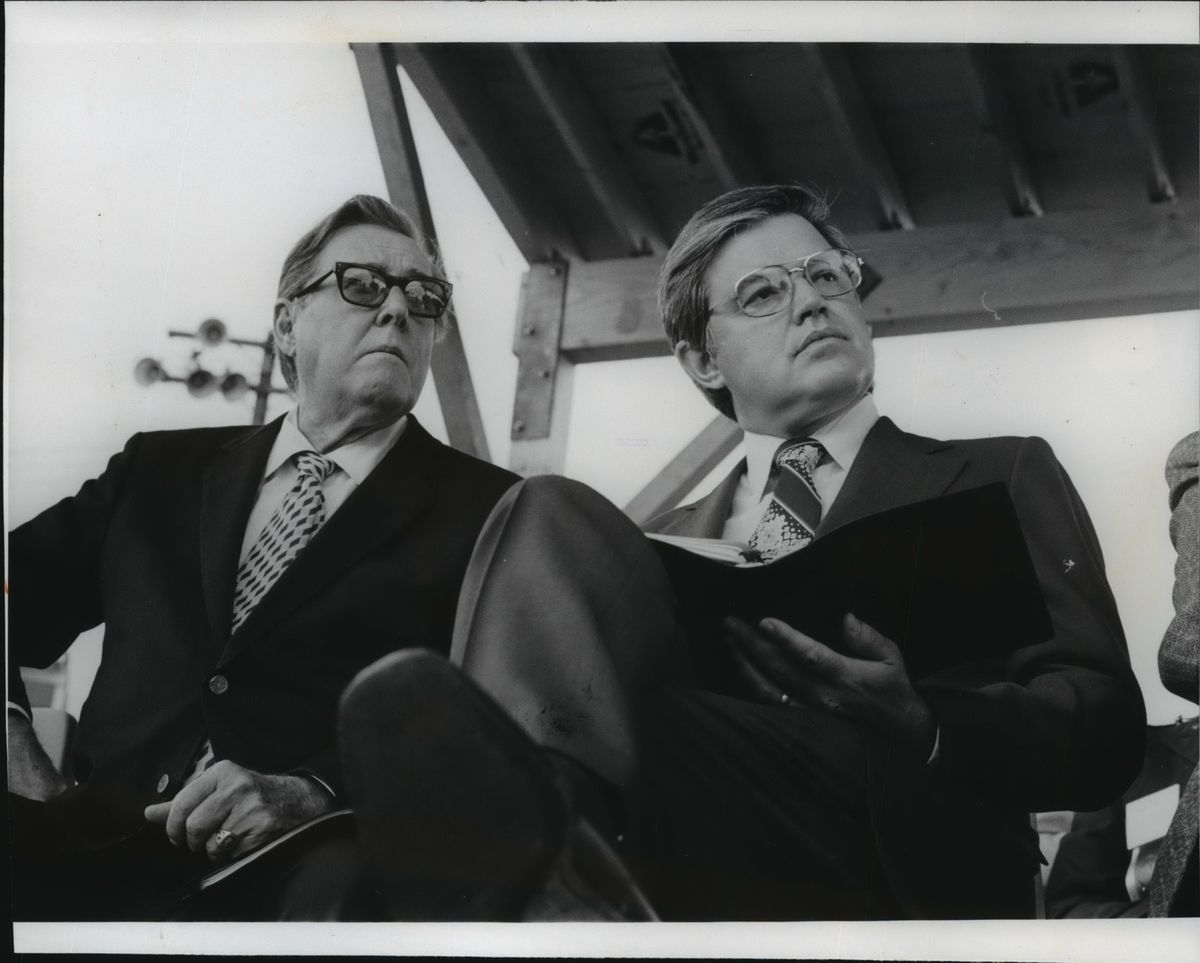We the People: Washingtonians are about to pick a senator. But they weren’t always selected by the people
Sen. Warren G. Magnuson, right, on July 2, 1974 presented a pair of Golden Eagles to Expo's Vanishing Species Pavilion for exhibit during the Expo '74, after which they were to be given to "Walk in the Wild," Spokane's zoo. David "Kit" Beecher, zoo director, is shown displaying the pair at "Sen. Warren G. Magnuson Day" in Boeing International Amphitheater. One of the eagles was named "Uncle Roderick." (Spokesman-Review archives)Buy a print of this photo
Each week, The Spokesman-Review examines one question from the Naturalization Test immigrants must pass to become United States citizens.
Today’s Question: Who does a U.S. senator represent?
Senators represent all the people of their state. Each state has two senators who are elected by citizens of their state.
But that was not originally the case, nor is it that simple, especially with so much money involved in winning a Senate campaign.
Senators were not always elected by voters. The 17th Amendment gave that power to the people in 1912 after decades of senators being selected by state legislators. The amendment was one of several – including the 13th, 14th, 15th, 19th and 24th – spearheaded by progressives who shifted constitutional theory away from what the framers envisioned to one that better democratized American politics at the time, said Cornell Clayton, director of the Thomas S. Foley Institute for Public Policy and Public Service.
At the time of the 17th Amendment, there was a lot of concern about corruption within state legislatures, Clayton said. After the Civil War, senatorial candidates were campaigning for state legislative candidates through “public canvass” in an attempt to get legislators who might elect them into the Senate into the legislature. The amendment was an attempt to hinder the corruption of state legislatures that were controlled by big-money interests like railroad and mining corporations.
“Progressives wanted to reform this primarily to remove some of the corruption of state legislatures in the control of the U.S. Senate, but also to deal with some of the dysfunction created by a closely divided electorate and closely held elections,” he said. “And that’s what the 17th Amendment represents. It’s about democratizing American politics.”
Senators have to weigh the interests of the people in their state and the best interests for the country, said Travis Ridout, professor at Washington State University’s School of Politics, Philosophy and Public Affairs. The federal government has the ability to regulate gas prices, and state citizens would probably like that, but lowering prices might increase gas consumption and the ill consequences of climate change. These are the dilemmas senators can face.
Senators represent their citizens in several ways, including constituent work like nominating citizens for military academies or responding to constituent complaints. But policy work is the main way senators should represent their citizens. For example, if there is a bill on agriculture subsidies being worked on, a senator should make sure that the interests of workers in their state, like wheat growers, are represented, Ridout said. Policy work, however, is also where representation begins to get complicated.
The country does not have a perfect democracy and there are still a lot of concerns about moneyed interests in government, not specific to the Senate, Clayton said.
“People who have money, businesses that have money, groups that have money to donate to politicians,” Ridout said. “They’re much more likely to get access to politicians and have their interests represented.”
To put it into perspective, he said, imagine being a senator working on a committee that is considering tax exemptions for a specific tax. If the senator was contacted by lobbyists from an organization that donates to their re-election campaign asking for an exemption, then the senator might be inclined to give it.
Money has a lot of ways to enter the system, Ridout said. As Senate elections are in the hands of voters, millions are spent on ads in favor of one candidate or against another. Over $6.4 billion has been spent on TV, radio and digital ads for races on all political levels during the 2022 midterm elections, according to CNBC.
Ads, specifically attack ads, can affect how politicians vote on matters, thereby impacting who is actually being represented. Some groups like the National Rifle Association have run attack ads on politicians who oppose issues they favor, said Ridout, who is also the co-director of the Wesleyan Media Project, which tracks political advertising. In 2016, the NRA spent $2 million on an anti-Hillary Clinton ad that ran nationwide with focuses on battleground states like Colorado, Nevada and Maine.
Political ads are not inherently negative, as they can also offer voters information about who a candidate is and what issues they stand for, Ridout said. A voter’s exposure to political ads can also inform them on what issues are in the forefront of the current political atmosphere, further affecting if and how they might vote.
Ideally, senators would keep close contact with the constituents in their state, but that is difficult. There is not only time and distance to consider as public policy is conducted on Capitol Hill, but historically, the policies enacted in Washington, D.C., tend to better represent the interests of the wealthy, Ridout said. There have been several attempts to better equalize representation, including Seattle’s attempt to give voters a financial voice through $100 “democracy vouchers” funded by a city property tax approved by voters in 2015.
Larger-scale campaign finance reforms have been met with a lot of cynicism and pushback. The Federal Election Campaign Act of 1971 was created to regulate campaign finance but only lasted two years, as it was overturned by the U.S. Supreme Court in Buckley v. Valeo in 1976. That decision found that statutory limits on campaign spending were unconstitutional. There have since been several federal campaign finance bills presented at various success rates, but campaign finance laws tend to be handled on the state level.
Although money impacts politics, by law, senators represent the people in their state. With Washington voters choosing one of their senators this November, it is important for them to know who that senator will represent.

